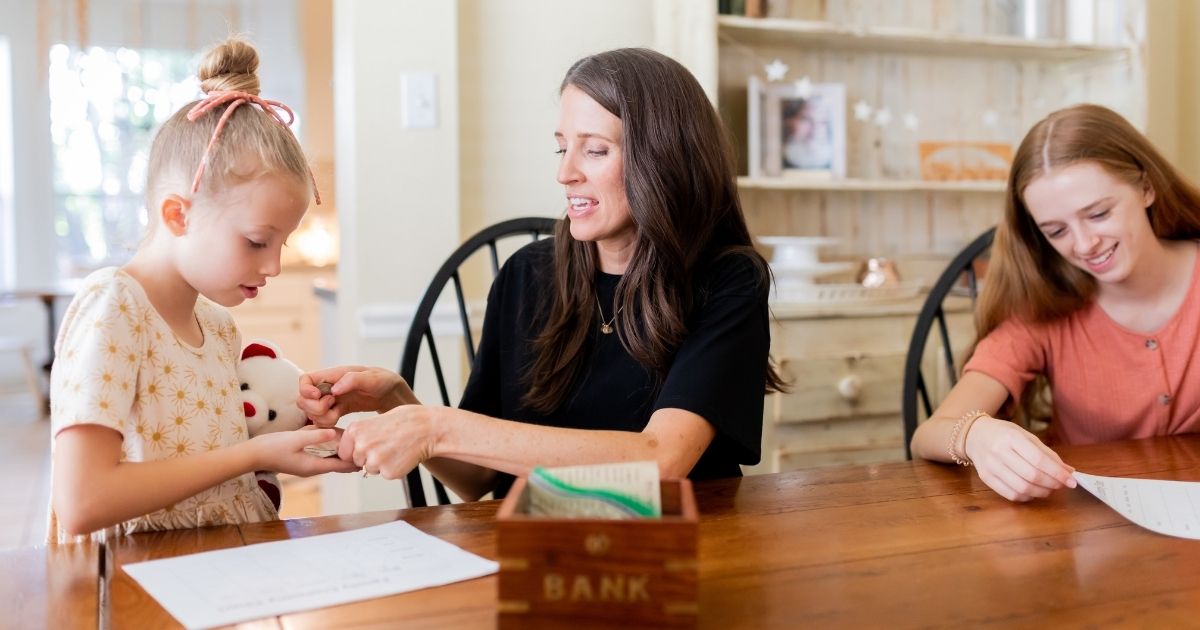See Our Family Economy System: The Two Best Reasons to Ditch an Allowance for how we use the family economy system to teach values in our family.
1. First of all, what is a family economy?
A family economy is a work and pay system in a home. The best family economies are built by parents who use their strengths to create them. Each one will and should look different because each family’s values and needs are different.
The most important thing is to use the system to help your child grow through their choices. The goal is to create a safe practice space of the real world at home through lots of purposeful opportunities to earn, spend, save, and give that money.
2. Why is a family economy important?
Children thrive on responsibility. It not only empowers your child, but it’s also the antidote to entitlement (can I get a hallelujah?). Lots of mini-life lessons are learned in a loving, supportive environment where the stakes are low and the timing is perfect.
Plus, you get to be the parent that says YES. “Yes, you can have that! Did you bring your money?”
Don’t be mistaken though! A family economy is not really about money. Money becomes the vehicle for character building and value teaching. Our children are learning work ethic, self-discipline, accountability, honesty, time management, delayed gratification, unity, empathy, and on and on.
See Our Family Economy System: The Two Best Reasons to Ditch an Allowance for more details!
3. Do you pay for all the chores you ask your children to do?
No, the family economy applies to a limited number of things. There are many things that our children do in our home that they are not paid for such as Saturday morning chores and after-dinner jobs.
4. Is the family economy optional for your children?
Yes, it is always optional. I have had a child too stressed with life to “come to work”. She needs a sick week. And that’s perfectly fine! The beauty about the family economy is that it’s a highly self-reinforcing system. No nagging required! As soon as she sees sisters adding to their bank accounts, she’s ready to jump in the next week. We do ask our children to always do their homework and practice piano. Those are not optional.
5. What if they never want to help?
That’s okay. Just remember to act unthreatened by their choice, but also hold a “gate” that they must walk through to earn privileges. For example, if my daughter isn’t interested in doing the family economy but would still like the privilege of playing with her friends outside I would say “Sure! Just as soon as your zone is done.”
6. What are the tasks that you pay for?
- Morning: Make their bed. Get ready for school. Clean up breakfast. Come to family prayer on time.
- Afternoon: Get ready for the next day, Piano, Homework
- Zone: The home is split into 4 sections and each section has a specific daily job.
- Bedtime: Brush teeth, put on pajamas, in bed on time
Remember, these are just the chores that work for our family at this stage of life. Yours should reflect your own needs and values.
7. Why do you pay your children for tasks they should just be doing?
Look at things a bit differently. It is your child’s job to help the family run smoothly. Each decision that they make (going to bed on time, cleaning up their breakfast) makes your life easier and the family stronger. And the more practice they get the more empowered they will feel. It’s a wonderful step in the direction of raising responsible, capable adults.
8. What are some examples of zone chores?
- Front room: sweep the entryway
- Kitchen: set the table
- Family Room: vacuum
- Toy Room: pick up anything out of place
*Be careful that the chore you assign for zones is something that won’t put the family at a big disadvantage if the child decides not to do the family economy that week. For example, dishes would not be a good idea. The zone should be something the child can complete in about 10-15 minutes.

9. How do you make sure they are accountable day by day?
The beautiful thing about the family economy is that is designed to run in the background, without any nagging and or pestering from the parent. A simple way to give a reminder is “Does anyone need me to check anything off?” (from their charts)
10. How can I learn more about how to set up a family economy?
I have an IGTV explaining more on Instagram. You can also read The Entitlement Trap by Richard and Linda Eyre. In it, they do a beautiful job of teaching why an economy is so important and give you step-by-step help on how to create one in your family.
You can also see Our Family Economy System: The 2 Best Reasons to Ditch an Allowance to learn how we use this system to teach strong values in our home.
Family Economy Bundle
We’ve created a bundle with everything you need to start your family economy today.
Included is a list of simple instructions, a versatile daily chart (available in 5 colors!), and everything above plus 10 more frequently asked questions.
If you want to learn more about our family economy system, you might also like these other resources.
- Simply on Purpose Webinar—Teaching the Value of Work: The Family Economy
- Our Family Economy System: The Best 2 Reasons to Ditch and Allowance
- Simply On Purpose IGTV: What is a Family Economy?
This article is based on the fabulous work of the Eyre Family. The Entitlement Trap, the premise of this idea, was originally written by Richard and Linda Eyre. (You can find more of their great work at ValuesParenting.com.)


Can’t wait to start
I’ve seen two versions of the FAQ, one where you use cash and one where you use checks. Have you found one to work better than the other?
Hi Katie,
Ralphie has used both checks and cash systems for the family economy. Both teach your children different life lessons about the value of money, so you can decide what works best for your family.